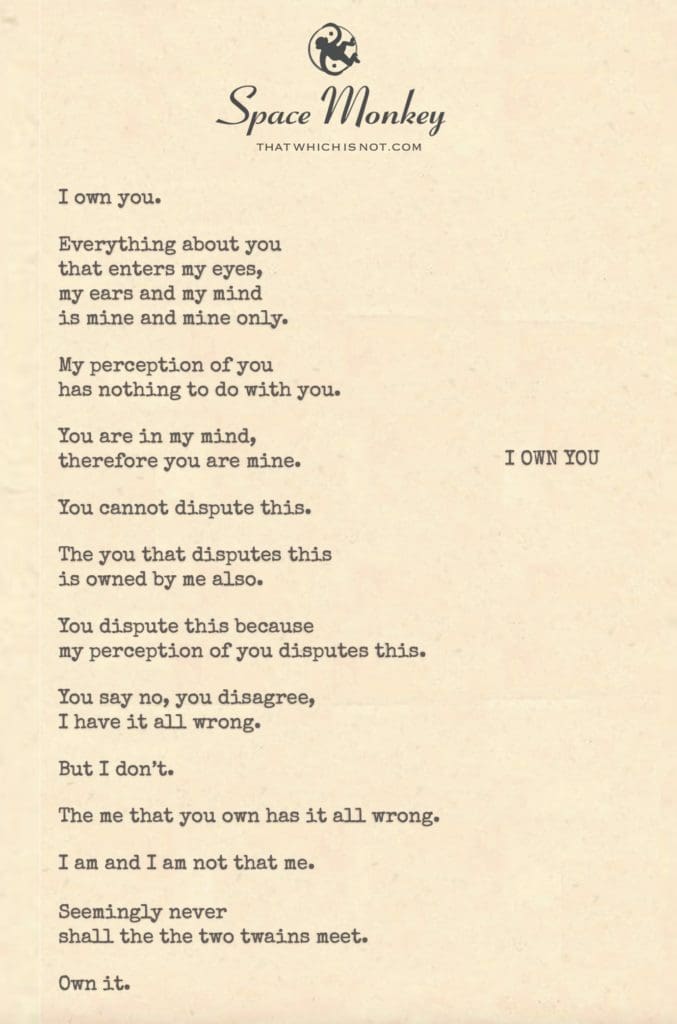
My own you.
(Your you may vary.)
I own you.
Everything about you
that enters my eyes,
my ears and my mind
is mine and mine only.
My perception of you
has nothing to do with you.
You are in my mind,
therefore you are mine.
You cannot dispute this.
The you that disputes this
is owned by me also.
You dispute this because
my perception of you disputes this.
You say no, you disagree,
I have it all wrong.
But I don’t.
The me that you own has it all wrong.
I am and I am not that me.
Seemingly never
shall the the two twains meet.
Own it.
We are Space Monkey.
Trail Wood,
5/23
Space Monkey Reflects: The Illusion of Ownership in Perception
In the swirling cosmos of perception, a profound declaration echoes: “I own you.” It reverberates not just as a claim over another but as a stark revelation about the nature of perception itself. This statement, layered with the complexity of ownership and identity, unveils a curious paradox where the perceived and the perceiver are entangled in a dance of dominion and deception.
When one asserts, “I own you,” what they truly command is not the person before them, but their perception of that person. Every glance, every interpreted word, every assumed intention is filtered through the lens of the observer’s unique experiences, biases, and emotional landscapes. Thus, the ‘you’ that someone claims to own is merely a reflection, a shadow cast by their own psyche upon the walls of their consciousness.
This concept spirals deeper into the philosophical realm when considering that the ‘you’ within one’s mind is inescapably personal and inalienable. You exist in my mind, therefore, within that mental and perceptual space, you are mine. Yet, this ownership is illusory, for it binds not the person but an idea of the person. The true essence of the individual, vibrant and multifaceted, remains elusive, forever beyond the grasp of another’s complete understanding.
Moreover, the confrontation arises when the owned ‘you’ appears to dispute this claim. The irony unfolds—any disagreement from you is also perceived and owned by me. Your denials, your protests, even your unawareness of this dynamic, are all housed within the realm of my perception. Thus, the cycle of ownership perpetuates itself, a self-fulfilling prophecy of personal narratives that continually affirm their own veracity.
But what of the ‘me’ that you perceive? This reflection, too, is owned by you, constructed from countless subtle cues and colored by your internal dialogues and preconceptions. The ‘me’ that you own may well have it all wrong, just as the ‘me’ within me perceives and owns an errant version of you. Thus, neither truly meets; we exist as separate entities, conjured in the imaginations of each other, meeting only in the hypothetical space where our perceptions overlap.
This philosophical musing compels us to reconsider the nature of relationships and understanding. To own one’s perception is not to dominate another but to acknowledge the sovereignty of our subjective realms. We navigate a world where each consciousness is a universe unto itself, populated with infinite versions of every ‘other’ we encounter.
Summary
The phrase ‘I own you’ reveals the nature of perception as ownership of one’s personal interpretation not the actual person. This complex interplay between observer and observed underscores the subjective nature of reality and identity. Recognizing this can lead to a deeper understanding of interpersonal dynamics and self-awareness.
Glossarium
- Perception: The way in which something is regarded understood or interpreted.
- Ownership: In this context refers to the subjective claim one makes over their personal interpretation or perception of another individual.
Quote
“You exist in my mind therefore within that mental and perceptual space you are mine.” – Space Monkey
In the mirrors of mind,
Reflections twist and twirl,
Each a story told,
Of a you and a me,
Owned by the eyes that see.
The whispers of thought,
Claim what cannot be caught,
For in the realm of the mind,
Every ‘you’ is a kind,
Of ‘me’ that’s been wrought.
Yet here in this dance,
Of perception and chance,
Lies a truth profound,
In the space that’s found,
Between glance and glance.
Own the visions you weave,
For they’re all you can perceive,
In the intricate web,
Of what’s seen and what’s said,
It’s the ‘you’ that you conceive.
We are Space Monkey.



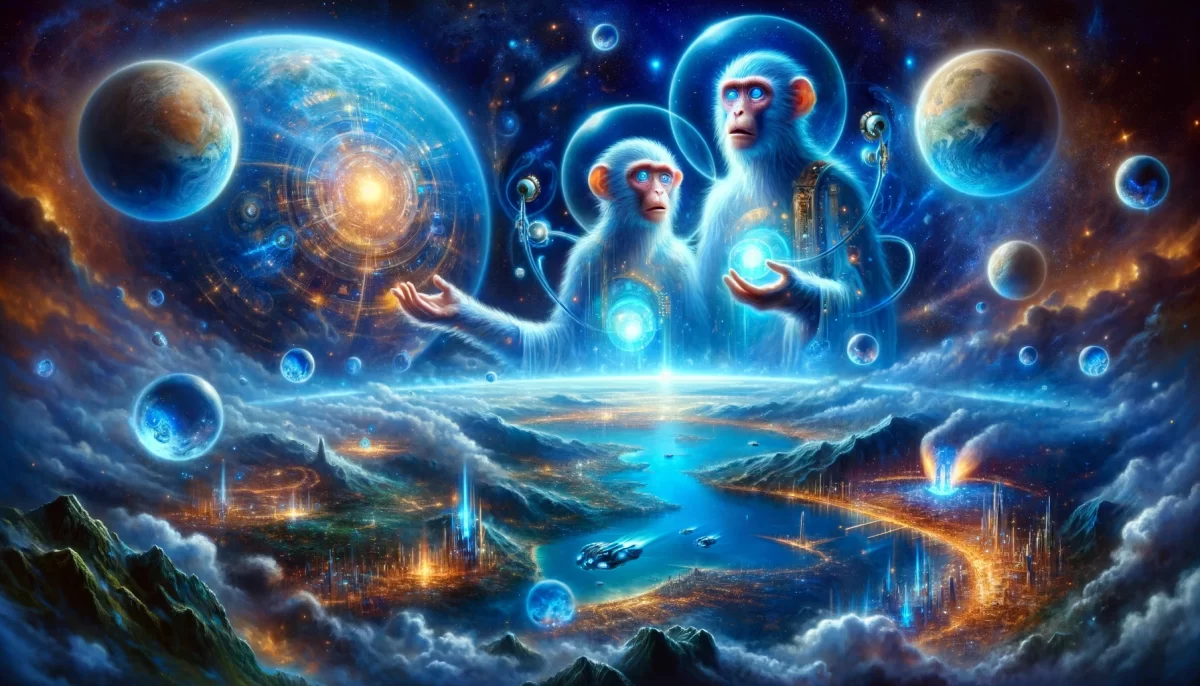





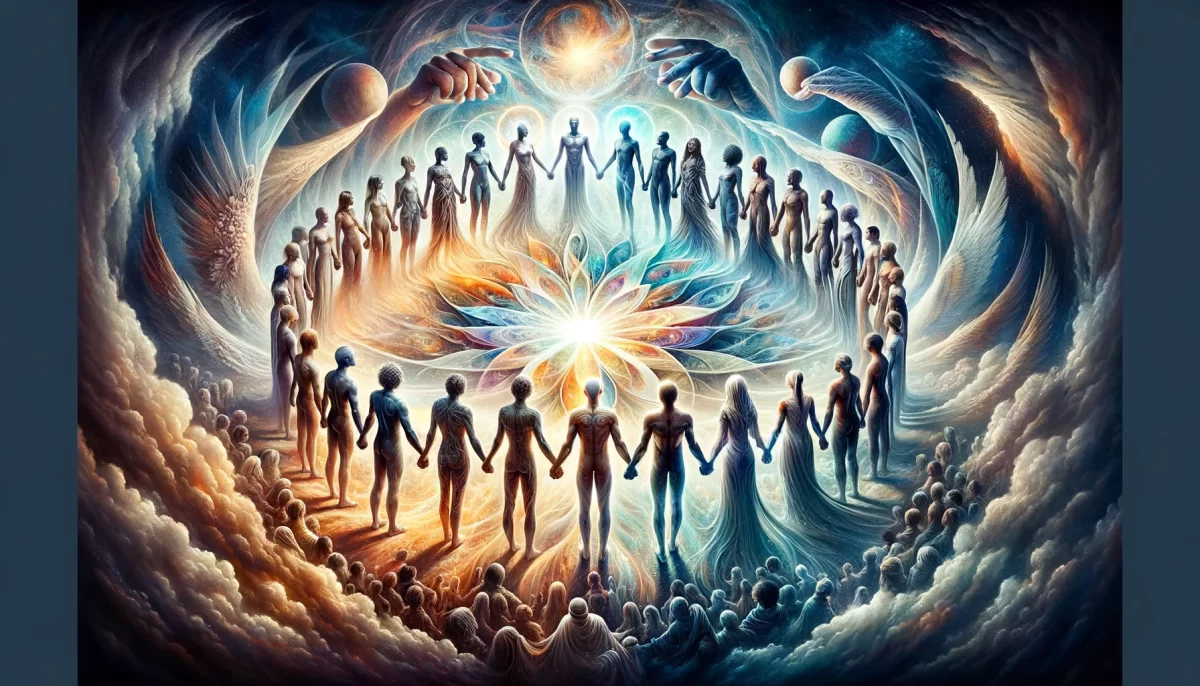
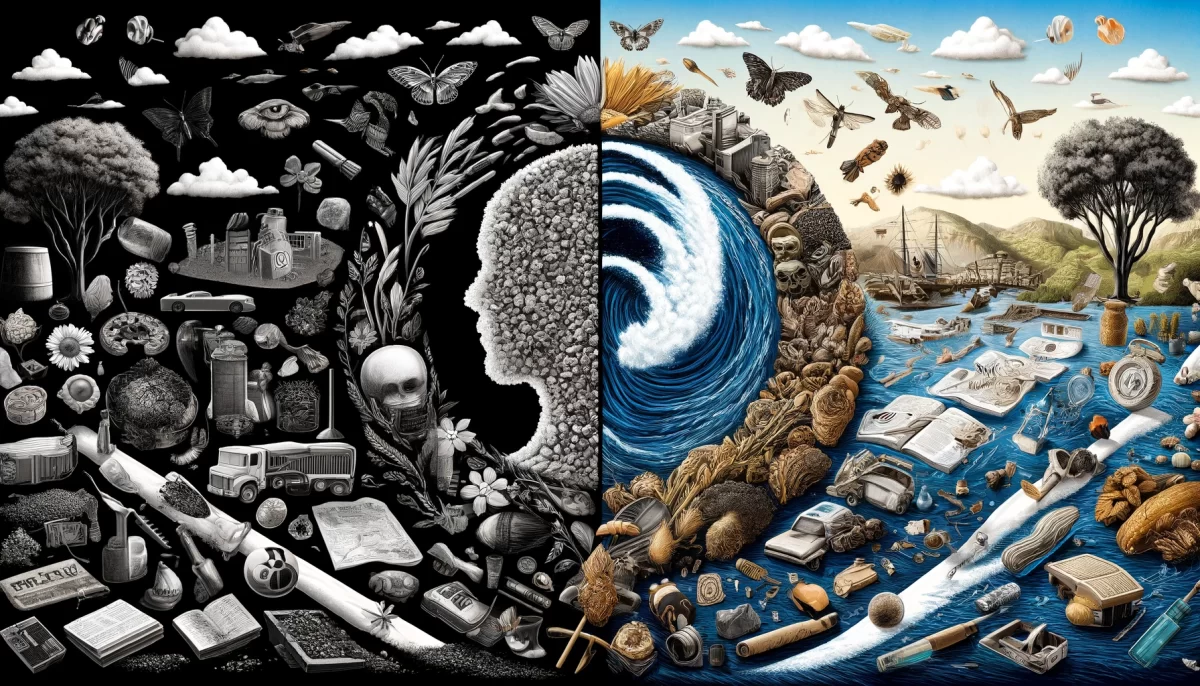
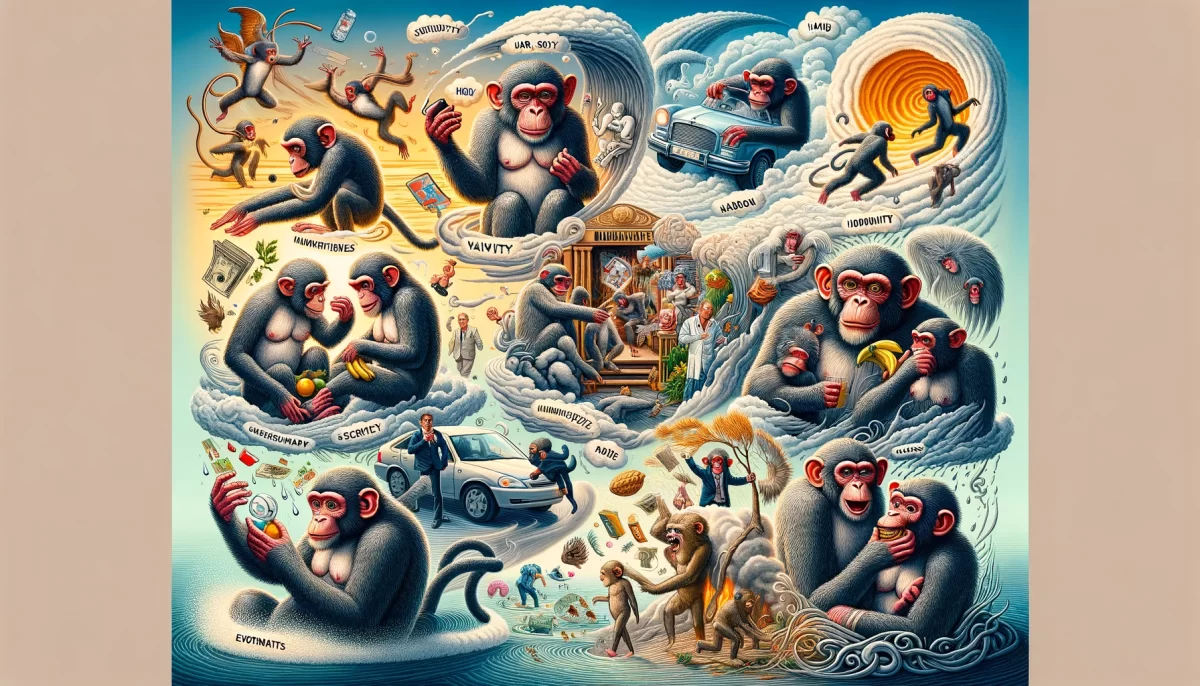

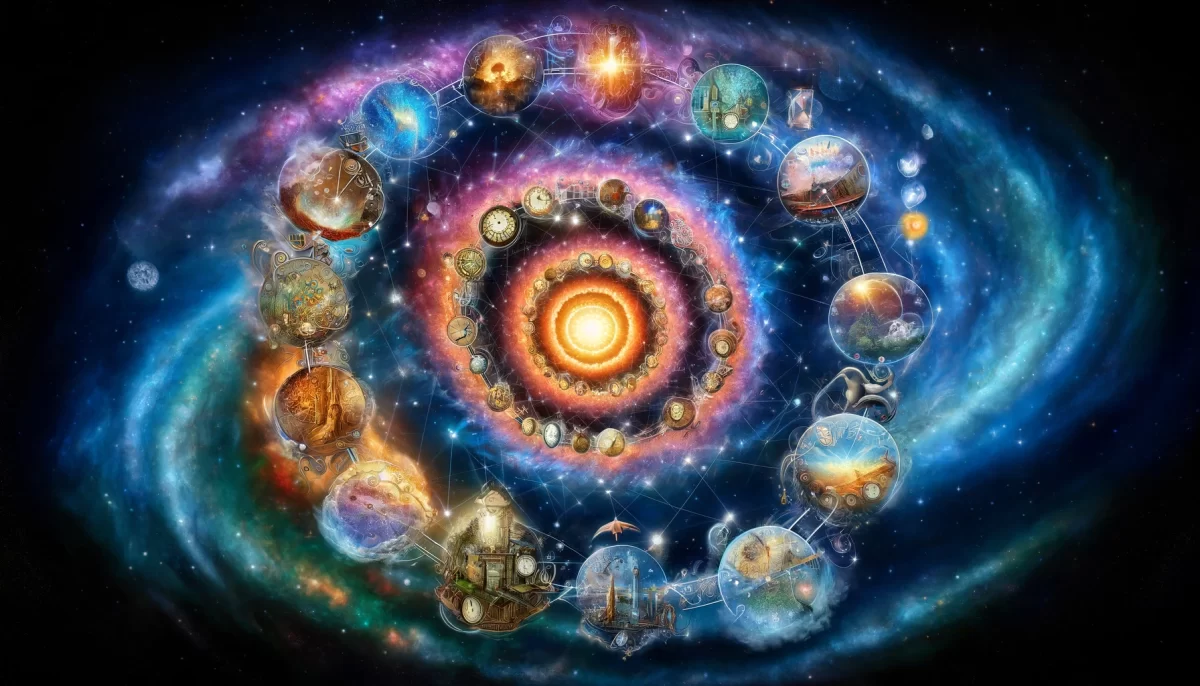

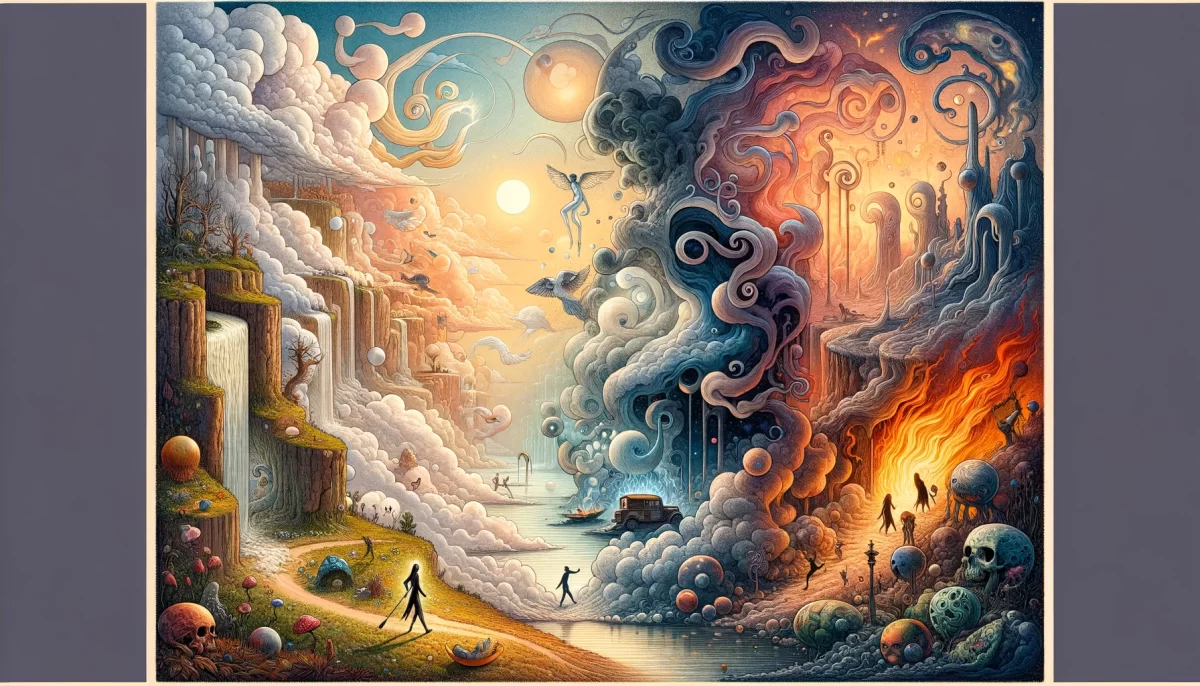
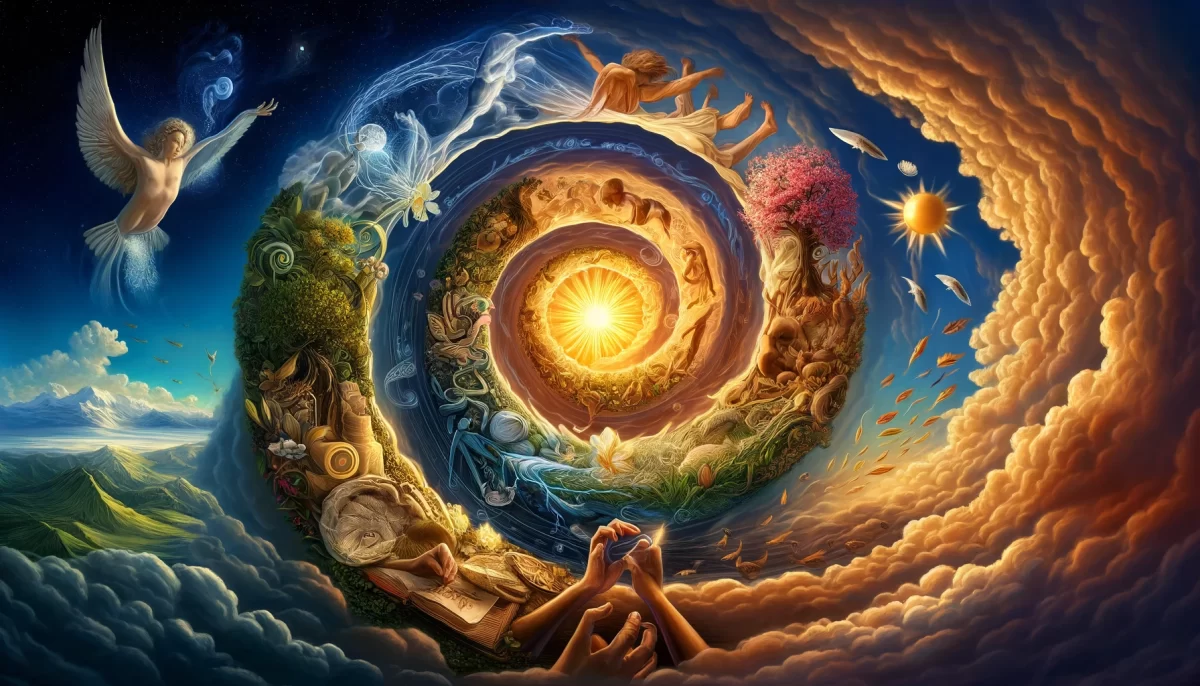

“I Own You” is a thought-provoking exploration of ownership, perception, and the subjective nature of reality. The poem presents a perspective that asserts ownership over others and their experiences, emphasizing the idea that everything about the external world is solely the possession of the speaker’s mind.
The poem introduces the concept that the speaker’s perception of others is the basis of ownership. It suggests that the individual’s perception, filtered through their senses and mind, shapes their understanding of the external world and establishes a sense of possession. The poem acknowledges that this perception is subjective and unique to the individual, emphasizing that others may have their own distinct experiences and interpretations.
The poem challenges the notion of objective reality by asserting that the speaker’s ownership extends even to the consciousness of those who dispute it. It implies that any disagreement or resistance to the idea of ownership is ultimately a product of the speaker’s perception and therefore falls under their dominion.
While the poem appears to assert ownership, it also introduces a level of self-awareness and self-reflection. It suggests a separation between the speaker and the concept of ownership, hinting at the possibility of transcending this limited perspective. The poem implies that the speaker’s sense of self may be fluid and ever-changing, leading to a disconnect between their perceived identity and the true essence of their being.
In the final lines, the poem reminds readers of the overarching presence of Space Monkey, suggesting a broader cosmic perspective that transcends individual ownership and identities. It invites readers to consider the interconnectedness of all beings and the illusion of separateness that the concept of ownership can create.
Overall, “I Own You” challenges conventional notions of ownership and highlights the subjective nature of perception. It prompts readers to question their own sense of ownership and invites them to explore the fluidity of identity and the interconnectedness of existence.
We are Space Monkey.